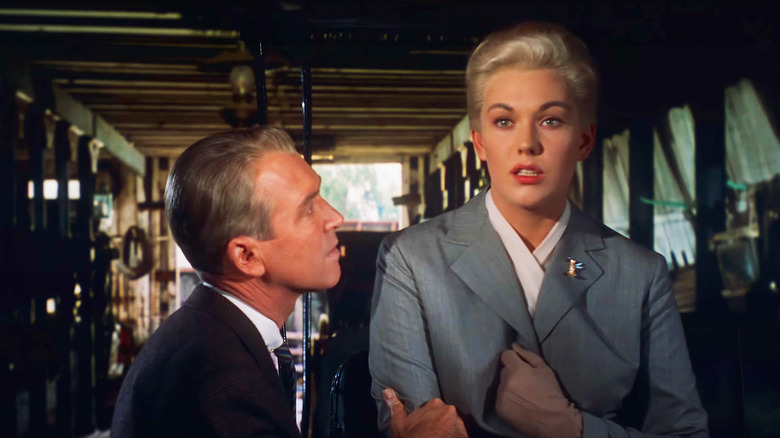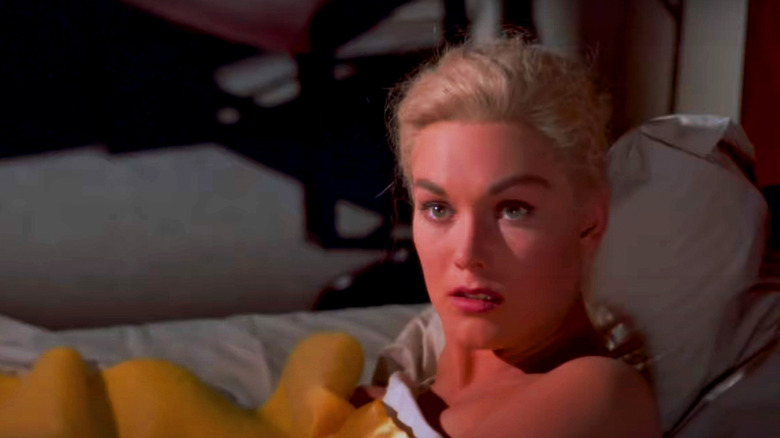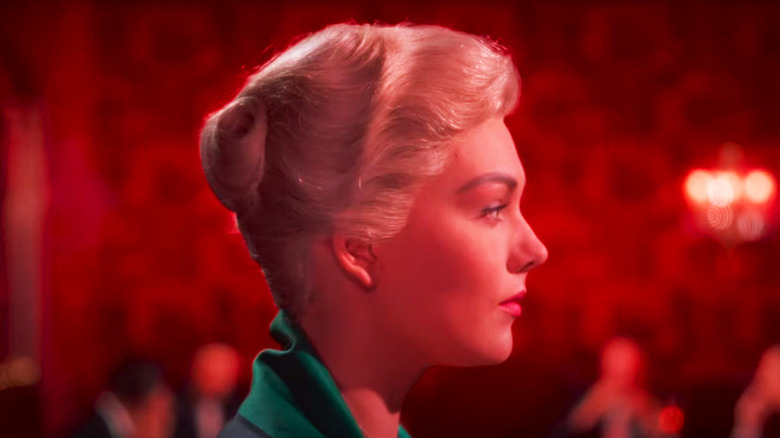James Stewart's Vertigo Character Wasn't Far Off From Alfred Hitchcock
"Vertigo" is the kind of movie that lends itself to any interpretation you want to throw at it. Its multi-layered narrative has all kinds of things to say about love, madness, and obsession — particularly of the male variety. But what makes the film especially noteworthy in comparison to Hitch's other work, is how he so boldly confronts what one reviewer called his own "thematic and personal sexual fixations."
Hitchcock is known for obsessing over every aspect of his films. But he saved his most pedantic fixation for his actresses, who he seemed to revel in controlling. In the case of "The Birds" star Tippi Hedren, the director made the poor woman's life miserable. And his onscreen treatment of women wasn't much better. The heroines of Hitchcock movies are often little more than representations of the director's own myopic view of females. They're at once conniving and helpless — caught in the larger machinations at play in whatever doom-laden storyline Hitch was playing out.
What was Hitchcock's deal? Well, that would take far longer than a single /Film article to hash out. But it seems the master of suspense was trying to figure that out himself. Rather than being blithely dismissive of his own nature, the director seemed aware of his proclivity for obsession and its negative consequences. Which, as it turns out, is one of the many interpretations which can be mapped onto "Vertigo." In fact, it easily maps on to "Vertigo." The film's star, James Stewart, plays a man whose treatment of the leading lady, Kim Novak, is clearly a mirror of Hitchcock's own behavior. And Novak was aware of that from the outset.
'The facade was everything'
Once Grace Kelly had managed to resist Hitchcock's advances and absconded with the Prince of Monaco, Hitch needed a new obsession. Several, in fact. So, his films cycled through leading ladies from Janet Leigh, to Eva Marie Saint, to Tippi Hedren, and of course, Kim Novak. Having starred alongside Frank Sinatra in 1957's "Pal Joey," Novak's star was on the rise and Hitchcock wanted to harness some of that power.
In "Vertigo," Stewart's character, Scottie, pursues Novak's Madeline, before witnessing what he believes to be her suicide. Madeline turns out to be an actress named Judy Barton — the specifics of which are a bit confusing if you haven't seen the movie. What matters, though, is that Scottie encounters Judy and becomes obsessed with the idea that she is actually Madeline (because, she kind of is). He then starts trying to reinvent her in the mold of Madeline, establishing a clear parallel between Scottie's obsession and Hitchcock's own ... and dropping some meta observations about directors and the control they exert.
None of which was lost on Novak, who in an interview, said Judy was, "In a sense, me, trying to become a Hollywood person ... needing to be loved." The actress also recognised how Stewart as Scottie basically represented a stand-in for Hitchcock:
"[Hitchcock] knew exactly what he wanted. The facade was everything to him. If the hair was off in any way, he was calling the hairdresser over constantly, "Fix that! In the back, the bun is twisted wrong!" He would notice that. He was obsessed with it, I would say. Obsessed with the look. It was as if he was Jimmy Stewart making sure that she was dressed exactly the way Madeline was. He was playing the part of Jimmy Stewart."
Vertigo's real mystery is Hitchcock himself
Strangely, Novak seems to have had things relatively easy compared to some other actors in Hitchcock movies. She eventually left Hollywood to become a painter, telling People: "I lost a sense of who I truly was." But whatever negative experiences she had in the industry, it seems Hitch wasn't the worst of them. Novak told one interviewer that the director "wouldn't say anything about [her] work in the movie but, on the other hand, he wouldn't complain, either." She also said that she "felt good" about what she was doing on-screen and that "technical points were [Hitchcock's] main thing," rather than controlling her behavior or appearance.
Maybe the director was all-too aware of his tendency to exert too much control over his actresses while shooting "Vertigo." The movie is, after all, obsessed with its director's own obsession, or as a New Yorker piece puts it "one of the great movies about movies, and about Hitchcock's own way with them." That "way" must have been in the forefront of Hitchcock's mind while filming, and perhaps that tempered his usual behavior. It obviously didn't last long, as Tippi Hedren would get the full force of it just five years later with 1963's "The Birds."
The most you can say is that at least Hitchcock was aware of his own issues with controlling actresses and demanding the impossible? Which isn't really all that redeeming. But perhaps "Vertigo" isn't just about Hitchcock being Scottie. Perhaps Hitchcock is also Judy, and, just like his heroine, was aware of his true nature and was actually imploring us the way Judy implores Scottie: "Couldn't you like me, just me, the way I am?" I'm not sure about "like." We'll stick with "appreciate" for now, Hitch.


